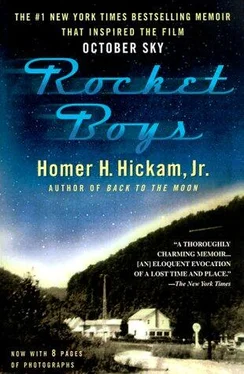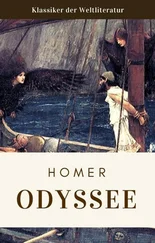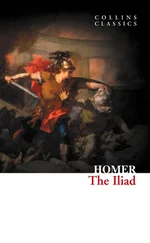Our house was on a corner where the state highway turned east toward the mine. A company-paved road went the other way to the center of town. Main Street, as it was called, ran down a valley so narrow in places that a boy with a good arm could throw a rock from one side of it to the other. Every day for the three years before I went to high school, I got on my bicycle in the morning with a big white canvas bag strapped over my shoulder and delivered the Bluefield Daily Telegraph down this valley, pedaling past the Coalwood School and the rows of houses that were set along a little creek and up on the sides of the facing mountains. A mile down Main was a large hollow in the mountains, formed where two creeks intersected. Here were the company offices and also the company church, a company hotel called the Club House, the post office building, which also housed the company doctor and the company dentist, and the main company store (which everybody called the Big Store). On an overlooking hill was the turreted mansion occupied by the company general superintendent, a man sent down by our owners in Ohio to keep an eye on their assets. Main Street continued westward between two mountains, leading to clusters of miners’ houses we called Middletown and Frog Level. Two forks led up mountain hollows to the “colored” camps of Mudhole and Snakeroot. There the pavement ended, and rutted dirt roads began.
At the entrance to Mudhole was a tiny wooden church presided over by the Reverend “Little” Richard. He was dubbed “Little” because of his resemblance to the soul singer. Nobody up Mudhole Hollow subscribed to the paper, but whenever I had an extra one, I always left it at the little church, and over the years, the Reverend Richard and I became friends. I loved it when he had a moment to come out on the church porch and tell me a quick Bible story while I listened, astride my bike, fascinated by his sonorous voice. I especially admired his description of Daniel in the lions’ den. When he acted out with bug-eyed astonishment the moment Daniel’s captors looked down and saw their prisoner lounging around in the pit with his arm around the head of a big lion, I laughed appreciatively. “That Daniel, he knew the Lord,” the Reverend summed up with a chuckle while I continued to giggle, “and it made him brave. How about you, Sonny? Do you know the Lord?”
I had to admit I wasn’t certain about that, but the Reverend said it was all right. “God looks after fools and drunks,” he said with a big grin that showed off his gold front tooth, “and I guess he’ll look after you too, Sonny Hickam.” Many a time in the days to come, when I was in trouble, I would think of Reverend Richard and his belief in God’s sense of humor and His fondness for ne’er-do-wells. It didn’t make me as brave as old Daniel, but it always gave me at least a little hope the Lord would let me scrape by.
The company church, the one most of the white people in town went to, was set down on a little grassy knob. In the late 1950’s, it came to be presided over by a company employee, Reverend Josiah Lanier, who also happened to be a Methodist. The denomination of the preacher the company hired automatically became ours too. Before we became Methodists, I remember being a Baptist and, once for a year, some kind of Pentecostal. The Pentecostal preacher scared the women, hurling fire and brimstone and warnings of death from his pulpit. When his contract expired, we got Reverend Lanier.
I was proud to live in Coalwood. According to the West Virginia history books, no one had ever lived in the valleys and hills of McDowell County before we came to dig out the coal. Up until the early nineteenth century, Cherokee tribes occasionally hunted in the area, but found the terrain otherwise too rugged and uninviting. Once, when I was eight years old, I found a stone arrowhead embedded in the stump of an ancient oak tree up on the mountain behind my house. My mother said a deer must have been lucky some long-ago day. I was so inspired by my find that I invented an Indian tribe, the Coalhicans, and convinced the boys I played with—Roy Lee, O’Dell, Tony, and Sherman—that it had really existed. They joined me in streaking our faces with berry juice and sticking chicken feathers in our hair. For days afterward, our little tribe of savages formed raiding parties and conducted massacres throughout Coalwood. We surrounded the Club House and, with birch-branch bows and invisible arrows, picked off the single miners who lived there as they came in from work. To indulge us, some of them even fell down and writhed convincingly on the Club House’s vast manicured lawn. When we set up an ambush at the tipple gate, the miners going on shift got into the spirit of things, whooping and returning our imaginary fire. My father observed this from his office by the tipple and came out to restore order. Although the Coalhicans escaped into the hills, their chief was reminded at the supper table that night that the mine was for work, not play.
When we ambushed some older boys—my brother, Jim, among them—who were playing cowboys up in the mountains, a great mock battle ensued until Tony, up in a tree for a better line of sight, stepped on a rotted branch and fell and broke his arm. I organized the construction of a litter out of branches, and we bore the great warrior home. The company doctor, “Doc” Lassiter, drove to Tony’s house in his ancient Packard and came inside. When he caught sight of us still in our feathers and war paint, Doc said he was the “heap big medicine man.” Doc set Tony’s arm and put it in a cast. I remember still what I wrote on it: Tony—next time pick a better tree . Tony’s Italian-immigrant father was killed in the mine that same year. He and his mother left and we never heard from them again. This did not seem unusual to me: A Coalwood family required a father, one who worked for the company. The company and Coalwood were one and the same.
I learned most of what I knew about Coalwood history and my parents’ early years at the kitchen table after the supper dishes were cleared. That was when Mom had herself a cup of coffee and Dad a glass of milk, and if they weren’t arguing about one thing or the other, they would talk about the town and the people in it, what was going on at the mine, what had been said at the last Women’s Club meeting, and, sometimes, little stories about how things used to be. Brother Jim usually got bored and asked to be excused, but I always stayed, fascinated by their tales.
Mr. George L. Carter, the founder of Coalwood, came in on the back of a mule in 1887, finding nothing but wilderness and, after he dug a little, one of the richest seams of bituminous coal in the world. Seeking his fortune, Mr. Carter bought the land from its absentee owners and began construction of a mine. He also built houses, school buildings, churches, a company store, a bakery, and an icehouse. He hired a doctor and a dentist and provided their services to his miners and their families for free. As the years passed and his coal company prospered, Mr. Carter had concrete sidewalks poured, the streets paved, and the town fenced to keep cows from roaming the streets. Mr. Carter wanted his miners to have a decent place to live. But in return, he asked for a decent day’s work. Coalwood was, after all, a place for work above all else: hard, bruising, filthy, and sometimes deadly work.
When Mr. Carter’s son came home from World War I, he brought with him his army commander, a Stanford University graduate of great engineering and social brilliance named William Laird, who everyone in town called, with the greatest respect and deference, the Captain. The Captain, a big, expansive man who stood nearly six and a half feet tall, saw Coalwood as a laboratory for his ideas, a place where the company could bring peace, prosperity, and tranquillity to its citizens. From the moment Mr. Carter hired him and placed him in charge of operations, the Captain began to implement the latest in mining technology. Shafts were sunk for ventilation, and as soon as it was practical, the mules used to haul out the coal from the mine were replaced by electric motors. Later, the Captain stopped all the hand digging and brought in giant machines, called continuous miners, to tear the coal from its seams. The Captain expanded Mr. Carter’s building program, providing every Coalwood miner a house with indoor plumbing, a Warm Morning stove in the living room, and a coal box the company kept full. For the town’s water supply, be tapped into a pristine ancient lake that lay a thousand feet below. He built parks on both ends of the town and funded the Boy Scouts, Girl Scouts, Brownies, Cub Scouts, and the Women’s Club. He stocked the Coalwood school library and built a school playground and a football field. Because the mountains interfered with reception, in 1954 he erected an antenna on a high ridge and provided one of the first cable television systems in the United States as a free service.
Читать дальше
Конец ознакомительного отрывка
Купить книгу












